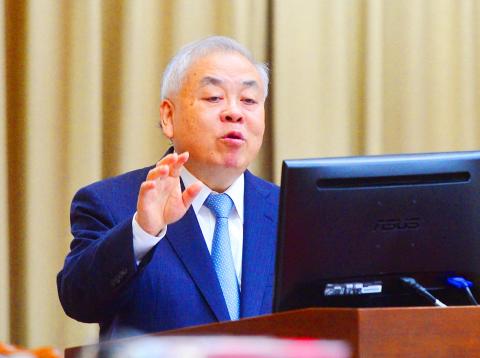The Executive Yuan’s annual expenditure for fiscal 2019 is expected to total NT$2 trillion (US$65.11 billion), with national defense spending increasing by 2.17 percent, or NT$7.1 billion, compared with fiscal 2018, sources said.
However, despite the increase, total defense spending will not reach President Tsai Ing-wen’s (蔡英文) promised 3 percent of national GDP, they said.
Current defense spending is less than 2 percent of GDP, although funding for plans to build domestic missile attack boats and purchase M1A2 Abrams main battle tanks could be included, Directorate-General of Budget, Accounting and Statistics Minister Chu Tzer-ming (朱澤民) said.

Photo: Wang Yi-sung, Taipei Times
Tsai expects a gradual increase in national defense spending that is not lower than an average of the past three years’ total defense spending, Chu said.
Premier William Lai (賴清德) is expected to preside over cross-agency budget meetings tomorrow to finalize budget ceilings for all governmental agencies, Chu said, but added that defense spending would be separated out so that the president could render a final decision.
Social welfare is to be the greatest expenditure for fiscal 2019, and is not expected to fall below the legally defined minimum of NT$490.6 billion, the sources said.
Public construction spending has reached an all-time high over the past eight years at NT$235.8 billion, including NT$140.8 billion for central government affairs, NT$86.2 billion for the Forward-looking Infrastructure Development Program and NT$8.8 billion for hydraulic engineering efforts, they said.
The Ministry of Transportation and Communications has earmarked NT$3 billion to NT$6 billion in public construction funding for the maintenance of provincial highways, as well as for highway improvement projects.
The Executive Yuan expects to pass the budget for fiscal 2019 before the middle of next month, before the Legislative Yuan’s September session begins.
The Ministry of Finance is to issue a report on the annual income expected for fiscal 2019, as new taxes are to go into effect, the sources said.

Right-wing political scientist Laura Fernandez on Sunday won Costa Rica’s presidential election by a landslide, after promising to crack down on rising violence linked to the cocaine trade. Fernandez’s nearest rival, economist Alvaro Ramos, conceded defeat as results showed the ruling party far exceeding the threshold of 40 percent needed to avoid a runoff. With 94 percent of polling stations counted, the political heir of outgoing Costa Rican President Rodrigo Chaves had captured 48.3 percent of the vote compared with Ramos’ 33.4 percent, the Supreme Electoral Tribunal said. As soon as the first results were announced, members of Fernandez’s Sovereign People’s Party

EMERGING FIELDS: The Chinese president said that the two countries would explore cooperation in green technology, the digital economy and artificial intelligence Chinese President Xi Jinping (習近平) yesterday called for an “equal and orderly multipolar world” in the face of “unilateral bullying,” in an apparent jab at the US. Xi was speaking during talks in Beijing with Uruguayan President Yamandu Orsi, the first South American leader to visit China since US special forces captured then-Venezuelan president Nicolas Maduro last month — an operation that Beijing condemned as a violation of sovereignty. Orsi follows a slew of leaders to have visited China seeking to boost ties with the world’s second-largest economy to hedge against US President Donald Trump’s increasingly unpredictable administration. “The international situation is fraught

MORE RESPONSIBILITY: Draftees would be expected to fight alongside professional soldiers, likely requiring the transformation of some training brigades into combat units The armed forces are to start incorporating new conscripts into combined arms brigades this year to enhance combat readiness, the Executive Yuan’s latest policy report said. The new policy would affect Taiwanese men entering the military for their compulsory service, which was extended to one year under reforms by then-president Tsai Ing-wen (蔡英文) in 2022. The conscripts would be trained to operate machine guns, uncrewed aerial vehicles, anti-tank guided missile launchers and Stinger air defense systems, the report said, adding that the basic training would be lengthened to eight weeks. After basic training, conscripts would be sorted into infantry battalions that would take

GROWING AMBITIONS: The scale and tempo of the operations show that the Strait has become the core theater for China to expand its security interests, the report said Chinese military aircraft incursions around Taiwan have surged nearly 15-fold over the past five years, according to a report released yesterday by the Democratic Progressive Party’s (DPP) Department of China Affairs. Sorties in the Taiwan Strait were previously irregular, totaling 380 in 2020, but have since evolved into routine operations, the report showed. “This demonstrates that the Taiwan Strait has become both the starting point and testing ground for Beijing’s expansionist ambitions,” it said. Driven by military expansionism, China is systematically pursuing actions aimed at altering the regional “status quo,” the department said, adding that Taiwan represents the most critical link in China’s